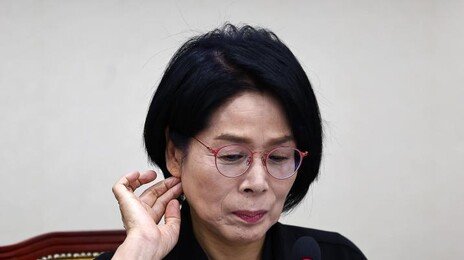공유하기
[뉴욕타임스로 논술을 잡아라]Male Pride And Female…
-
입력 2006년 6월 6일 03시 04분
글자크기 설정
When there are three women for every two men graduating from college, whom will the third woman marry? This is not an academic question. Women, who were a minority on campuses a quarter-century ago, today make up 57 percent of undergraduates, and the gender gap is projected to reach a 60-40 ratio within a few years. So more women, especially black and Hispanic women, will be in a position to get better-paying, more prestigious jobs than their husbands, which makes for a tricky variation * of “Pride and Prejudice.” 1)
It's still a universal truth, as Jane Austen wrote, that a man with a fortune has good marriage prospects *. It's not so universal for a woman with a fortune, because pride makes some men determined to be the chief breadwinner *. But these traditionalists seem to be a dwindling minority as men have come to appreciate the value of a wife's paycheck.
A woman's earning power, while * hardly the first thing that men look for, has become a bigger draw *, as shown in surveys of college students over the decades. In 1996, for the first time, college men rated a potential mate's financial prospects as more important than her skills as a cook or a housekeeper.
In the National Survey of Families and Households conducted during the early 1990's, the average single man under 35 said he was quite willing to marry someone earning much more than he did. He wasn't as interested in marrying someone making much less than he did, and he was especially reluctant to marry a woman who was unlikely to hold a steady job.
Those findings jibe * with what I've seen. I can't think of any friend who refused to date a woman because she made more money than he did. When friends have married women with bigger paychecks, the only financial complaints I've heard from them have come when a wife later decided to pursue a more meaningful - i.e., less lucrative - career.
Nor can I recall hearing guys insult a man, to his face or behind his back, for making less than his wife. The only snide comments I've heard have come from women talking about their friends' husbands. I've heard just a couple of hardened Manhattanites do that, but I wouldn't dismiss them as isolated reactionaries * because you can see this prejudice in that national survey of singles under 35.
The women surveyed were less willing to marry down - marry someone with much lower earnings or less education - than the men were to marry up 2). And, in line with Jane Austen, the women were also more determined to marry up than the men were.
You may think that women's attitudes are changing as they get more college degrees and financial independence. A women who's an executive can afford to marry a struggling musician. But that doesn't necessarily mean she wants to. Studies by David Buss of the University of Texas and others have shown that women with higher incomes, far from relaxing their standards, put more emphasis on a mate's financial resources.
And once they're married, women with higher incomes seem less tolerant of their husbands' shortcomings. Steven Nock of the University of Virginia has found that marriages in which the wife and husband earn roughly the same are more likely to fail than other marriages. That situation doesn't affect the husband's commitment to the marriage, Nock concludes, but it weakens the wife's and makes her more likely to initiate divorce.
It's understandable that women with good paychecks have higher standards for their partners, since their superior intelligence, education and income give them what Buss calls high “mate value.” They know they're catches * and want to find someone with equal mate value - someone like Mr. Darcy instead of a dullard * like the cleric spurned * by Elizabeth Bennet. 3)
“Of course, some women marry for love and find a man's resources irrelevant,” Buss says. “It's just that the men women tend to fall in love with, on average, happen to have more resources.”
Which means that, on average, college-educated women and high-school-educated
men will have a harder time finding partners as long as educators keep ignoring the gender gap that starts long before college. Advocates for women have been so effective politically that high schools and colleges are still focusing on supposed discrimination against women: the shortage of women in science classes and on sports teams rather than the shortage of men, period *. You could think of this as a victory for women's rights, but many of the victors will end up celebrating alone.
■ 돋보기
이 글은 뉴욕타임스 ‘Editorial observer’에 실린 글입니다. 본격적인 칼럼이라기보다는 동아일보의 ‘횡설수설’ 같은 코너죠. 앞서 소개했던 데이비드 브룩스의 ‘Mind over Muscle’과도 통하는 이야기입니다.
낙혼(落婚·marry down)과 앙혼(仰婚·marry up)은 드라마와 소설의 단골 소재입니다. 여성의 교육 수준과 소득이 높아지면서 같은 수준의 남성과 결혼하기 어려워지는 현상은 미국뿐 아니라 한국에서도 현실화하고 있습니다. 농촌 총각들은 장가들기가 어려워 동남아에서 신부를 수입해야 하는데 도시의 고학력 여성 중에는 혼자 사는 여성이 많습니다.
고학력 전문직 남성들은 낙혼을 하는 일이 드물지 않습니다. 비서처럼 편한 여성을 찾거나 ‘얼짱’을 추구하는 남성도 있지요. 제인 오스틴의 ‘오만과 편견’에서도 귀족 남성 다아시는 서민 집안의 엘리자베스와 낙혼을 했습니다.
오늘날 양성의 평등과 여성 교육의 확대로 여성이 남성보다 더 좋은 직업을 갖고 더 높은 소득을 올리는 경우가 흔해지고 있습니다. 현실 속의 여성들도 엘리자베스처럼 더 나은 조건을 가진 남성과 앙혼하려는 경향이 강합니다. 이러한 현상 때문에 고학력층에서 수요 공급이 맞지 않아 여성 상위 시대를 독신(獨身)으로 축하하는 여성이 늘어나고 있다고 필자는 지적하고 있습니다. 결혼과 가정은 인류가 지구상에서 종(種)을 이어가기 위한 기본적인 사회제도입니다. 여성들이 결혼을 안 하거나, 결혼 하더라도 출산을 늦추거나, 하나만 낳는 풍조로 저출산 문제가 심각합니다. 이 칼럼은 결혼의 사회경제학이라고 할 만합니다. 이 칼럼을 공부하며 남녀 평등, 여성 교육의 확대, 결혼 시장의 수요 공급, 저출산 같은 주제에 대해 생각해 보기 바랍니다.☞ 자세한 주해는 이지논술 사이트를 참조하세요.
황호택 논설위원
뉴욕타임스 >
-

어린이 책
구독
-

게임 인더스트리
구독
-

동아시론
구독
트렌드뉴스
-
1
‘꿈’ 같던 연골 재생, 현실로? 스탠포드대, 관절염 치료 새 돌파구
-
2
野 “25평서 5명 어떻게 살았나”…이혜훈 “잠만 잤다”
-
3
“내가 불륜 피해자”…아내 외도 계기로 사설탐정 된 개그맨
-
4
이해찬, 베트남서 심정지-수술…李대통령, 조정식 특보 급파
-
5
‘이재용 장남’ 이지호 소위, 해외파병 간다…태국 ‘코브라골드’ 파견
-
6
與초선 28명도 “대통령 팔지 말고 독단적 합당 중단하라”
-
7
집값 잡으려 ‘갭투자 1주택’도 규제할듯… “매물 되레 줄것” 전망도
-
8
“고수익 보장”에 2억 맡긴 리딩방 전문가, AI 딥페이크였다
-
9
[횡설수설/이진영]82세에 6번째 징역형 선고받은 장영자
-
10
고교 중퇴 후 접시닦이에서 백만장자로…“생각만 말고 행동하라”[손효림의 베스트셀러 레시피]
-
1
이혜훈 “장남 결혼직후 관계 깨져 함께 살아…이후 다시 좋아져”
-
2
수도권급 간-담도-췌장 수술 역량으로 지방 의료 살린다
-
3
이해찬, 베트남서 심정지-수술…李대통령, 조정식 특보 급파
-
4
[단독]이혜훈 “장남 다자녀 전형 입학” 허위 논란
-
5
민주, 조국당 3∼7% 지지율 흡수해 서울-부산-충청 싹쓸이 노려
-
6
“아파트 포기할 용의 있나 없나”에…이혜훈 “네” “네” “네”
-
7
“육해공사 통합, 국군사관대학교 신설” 국방부에 권고
-
8
與최고위원 3명 “민주당, 정청래 사당 아냐…합당 제안 사과하라”
-
9
[단독]美투자사 황당 주장 “李정부, 中경쟁사 위해 美기업 쿠팡 공격”
-
10
李 “코스피 올라 국민연금 250조원 늘어…고갈 걱정 안해도 돼”
트렌드뉴스
-
1
‘꿈’ 같던 연골 재생, 현실로? 스탠포드대, 관절염 치료 새 돌파구
-
2
野 “25평서 5명 어떻게 살았나”…이혜훈 “잠만 잤다”
-
3
“내가 불륜 피해자”…아내 외도 계기로 사설탐정 된 개그맨
-
4
이해찬, 베트남서 심정지-수술…李대통령, 조정식 특보 급파
-
5
‘이재용 장남’ 이지호 소위, 해외파병 간다…태국 ‘코브라골드’ 파견
-
6
與초선 28명도 “대통령 팔지 말고 독단적 합당 중단하라”
-
7
집값 잡으려 ‘갭투자 1주택’도 규제할듯… “매물 되레 줄것” 전망도
-
8
“고수익 보장”에 2억 맡긴 리딩방 전문가, AI 딥페이크였다
-
9
[횡설수설/이진영]82세에 6번째 징역형 선고받은 장영자
-
10
고교 중퇴 후 접시닦이에서 백만장자로…“생각만 말고 행동하라”[손효림의 베스트셀러 레시피]
-
1
이혜훈 “장남 결혼직후 관계 깨져 함께 살아…이후 다시 좋아져”
-
2
수도권급 간-담도-췌장 수술 역량으로 지방 의료 살린다
-
3
이해찬, 베트남서 심정지-수술…李대통령, 조정식 특보 급파
-
4
[단독]이혜훈 “장남 다자녀 전형 입학” 허위 논란
-
5
민주, 조국당 3∼7% 지지율 흡수해 서울-부산-충청 싹쓸이 노려
-
6
“아파트 포기할 용의 있나 없나”에…이혜훈 “네” “네” “네”
-
7
“육해공사 통합, 국군사관대학교 신설” 국방부에 권고
-
8
與최고위원 3명 “민주당, 정청래 사당 아냐…합당 제안 사과하라”
-
9
[단독]美투자사 황당 주장 “李정부, 中경쟁사 위해 美기업 쿠팡 공격”
-
10
李 “코스피 올라 국민연금 250조원 늘어…고갈 걱정 안해도 돼”
-
- 좋아요
- 0개
-
- 슬퍼요
- 0개
-
- 화나요
- 0개
![[뉴욕타임스로 논술을 잡아라]The Culture Of Nations](https://image.donga.com/donga_v1/images/img_default.png)



댓글 0